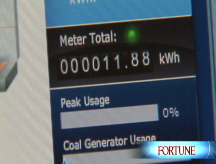Stimulus to propel energy jobs
Energy secretary says most utility construction projects slated for funding in the stimulus package are 'shovel-ready,' and could yield energy sector jobs soon.
WASHINGTON (CNN) -- Energy Secretary Steven Chu says jobs will come quickly from the energy component of the president's economic stimulus plan, as the government prepares to approve government-backed loans for utility construction projects.
"Many of those investments are now shovel-ready," Chu told reporters Wednesday. "They can get out there in months, and we can begin employing workers to rebuild America's infrastructure and create new jobs."
In his first public appearance since taking a Cabinet post in the Obama administration, Chu spoke to the National Electricity Delivery Forum, saying the checks will start going out in late April or early May.
"We are looking at the loans in progress," he said afterward. "We think that we can accelerate them greatly and get them out the door very soon."
Chu, who shared the 1997 Nobel Prize for his research in physics, told reporters that spending money on the nation's power system is "just like the projects in the Great Depression - you're helping rebuild and revitalize."
He indicated the administration will keep close tabs on how the money is spent, in light of the controversy over what was done with federal money applied to the financial industry near the end of the Bush administration.
"We take very seriously how to spend that money wisely, but also quickly," Chu said, "something of this scale, to ask the federal government to actually get that money out in a wise but quick way is something that's an incredible challenge."
Chu described his agency as "fundamentally a science and technology house," supporting and encouraging research at universities and laboratories.
Solar power is one challenge for those researchers, according to Chu. "Give us a new generation of photovoltaics" to improve the efficiency of generating electricity from the sun, he said. "The current, best photovoltaics still remain silicon, which was discovered at Bell Laboratories in the 1930s."
He expressed optimism, noting that "there's a lot of smart young people now who have gotten very concerned about our energy problems in all its facets, in terms of economic prosperity, in terms of dependency on foreign energy, and because of the climate change issues." ![]()


